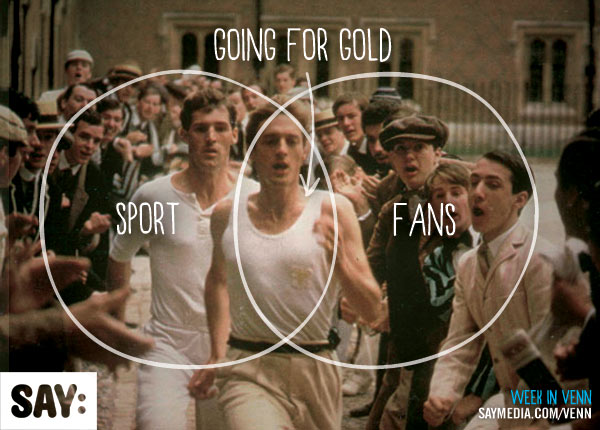Advertising's Olympic-Size Problem - SAY Media

A summer festival of sport in Europe stretches out before us like never before. From the Euro 2012 football pitches of Poland and Ukraine to tennis at Wimbledon, Lords cricket, and the London Olympics – this summer will bring Britain its biggest sporting marathon in 50 years. Like the athletes and players they hope to associate themselves with, marketers will be planning their summer carefully and looking to strike gold. According to a Nielsen study, in 2008 Chinese advertising spending increased 40% during the Beijing Olympics. London 2012 is a different market in a different economic climate, but media commentators still refer to the Olympic effect when forecasting ad spending this year.
What's behind the love affair between advertisers and sport? Studies regularly show that consumers find it difficult to correctly identify event sponsors, never mind fringe advertisers. So is it really worth the premium?
Last Bastion of Mass Audience Advertisers love sport because in a fragmenting media world, it is the last bastion of a mass audience. Over 20 million viewers in the UK tuned in to the 2010 World Cup final while UK internet traffic increased by 500% during the opening ceremony of the Beijing Olympics. And it's the right kind of audience, those predominantly upmarket males who love to buy new TVs, beer and snacks. The attraction is obvious, and yet that is the problem. Fifty-five brands will be officially associated with London 2012 with a further fifteen sponsoring the football Euro 2012 finals. With the addition of any number of other advertisers seeking to take advantage of the sporting summer, audience attention will be scarce.
So how do marketers turn sporting passion into attention for their brand? Official sponsorship allows brands to be closer to the action, to exclusively communicate in and around the stadiums and benefit from the association with the event. Yet for every sponsor who is correctly recalled by consumers, their rivals are usually also thought to be involved. After Beijing, Adidas was correctly identified by 28% of survey respondents as an official Games sponsor yet 15% believed that Nike was an Olympic partner too. In the marketing maelstrom of major sporting events it's difficult to stand out and be heard.
The Key Is Engaging Experiences Coca-Cola occupied a third of all bus shelters in Beijing during the 2008 Olympics in what was described as 'the biggest ever outdoor campaign in China.' Research showed that they achieved favorability among Chinese consumers but failed to convert that into market share in the competition with Pepsi.
In South Africa, ahead of the 2010 World Cup, Nike placed an LED screen on the side of the tallest building in Johannesburg and encouraged football fans to send messages of support from Twitter, Facebook and MXit, a hundred of which were displayed on the screen each night. The screen was visible from the Soccer City stadium and right across central Johannesburg marrying mass coverage with an engaging experience. Even Kobe Bryant sent a message of support and Nike came out of the World Cup with almost every media publication in South Africa proclaiming their marketing victory over the official sponsors.
London 2012 will be the most digitally connected Olympics ever and is an unrivalled vehicle to reach a mass audience. Embracing and truly engaging that audience is going to be the key to going for gold.
Dan Watson is Solutions Director forSAY Media UK.
SAY Media is a digital publishing company that creates amazing media brands. Through its technology platform and media services, SAY enables its portfolio of independent content creators to build passionate communities around key consumer interest areas such as Style, Living, Food and Tech. For more information visit www.saymedia.com.
Read all SAY Media's MediaBizBloggers commentaries at SAY Daily.
Check us out on Facebook at MediaBizBloggers.com
Follow our Twitter updates @MediaBizBlogger
The opinions and points of view expressed in this commentary are exclusively the views of the author and do not necessarily represent the views of MediaBizBloggers.com management or associated bloggers. MediaBizBloggers is an open thought leadership platform and readers may share their comments and opinions in response to all commentaries.

